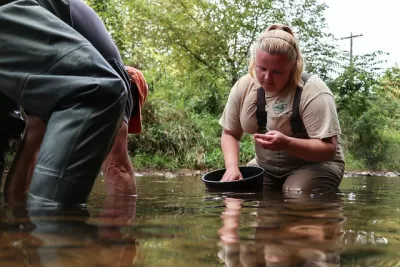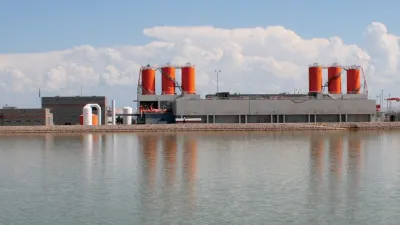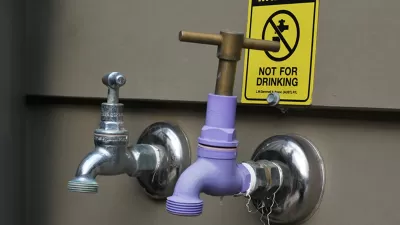In a region where the utility is on the "brink of financial collapse," residents face outages, boil-water advisories and bills that come with health warnings.

Published the same week as the Trump Administration's infrastructure plan, a bleak portrayal of water supply in rural Kentucky is a reminder of how decades of neglect have impacted parts of the nation with the fewest resources.
"Sometimes they get no water," Jenny Jarvie reports from Martin County, which lies along the border with West Virginia. "Other times just a trickle. Often, they say, their water is so discolored it resembles milk or Kool-Aid or beer."
Since 2012, the Martin County Water District has been cited no fewer than 36 times for violations of the Environmental Protection Agency's safe drinking water standards.
"Water outages and boil-water advisories have long plagued this rugged former coal mining region on the eastern tip of Kentucky, where more than half a century ago President Lyndon Johnson launched his war on poverty. Frequently, water bills here come with warnings — notifying residents the water contains high levels of disinfectant byproducts that could, over time, increase their risk of liver and kidney problems and cancer."
It's not so much a problem of polluted supply as it is of what happens between the treatment plant and the tap—more than 50 percent of the water is lost to "aging, leaky pipes" that also allow contaminated groundwater to get in.
Like an alarmingly large percentage of water utilities across the country, the MCWD doesn't have money for major repairs. After service was completely shut off to more than a thousand residents this winter due to frozen pipes, the county declared a state of emergency and asked the state if it could raise rates by 49 percent; the state has not yet decided.
And even then, Jarvie reports, the chair of the water board describes the rate raise as "putting a patch on a bomb."
"Officials representing the water district, which is more than $800,000 in debt and has been estimated to be in need of around $13 million for repairs, told the commission they were on the brink of financial collapse."During the winter outages, employees had to resort to digging up old lines and making repairs with used parts."

Maui's Vacation Rental Debate Turns Ugly
Verbal attacks, misinformation campaigns and fistfights plague a high-stakes debate to convert thousands of vacation rentals into long-term housing.

Planetizen Federal Action Tracker
A weekly monitor of how Trump’s orders and actions are impacting planners and planning in America.

San Francisco Suspends Traffic Calming Amidst Record Deaths
Citing “a challenging fiscal landscape,” the city will cease the program on the heels of 42 traffic deaths, including 24 pedestrians.

Defunct Pittsburgh Power Plant to Become Residential Tower
A decommissioned steam heat plant will be redeveloped into almost 100 affordable housing units.

Trump Prompts Restructuring of Transportation Research Board in “Unprecedented Overreach”
The TRB has eliminated more than half of its committees including those focused on climate, equity, and cities.

Amtrak Rolls Out New Orleans to Alabama “Mardi Gras” Train
The new service will operate morning and evening departures between Mobile and New Orleans.
Urban Design for Planners 1: Software Tools
This six-course series explores essential urban design concepts using open source software and equips planners with the tools they need to participate fully in the urban design process.
Planning for Universal Design
Learn the tools for implementing Universal Design in planning regulations.
Heyer Gruel & Associates PA
JM Goldson LLC
Custer County Colorado
City of Camden Redevelopment Agency
City of Astoria
Transportation Research & Education Center (TREC) at Portland State University
Jefferson Parish Government
Camden Redevelopment Agency
City of Claremont




























